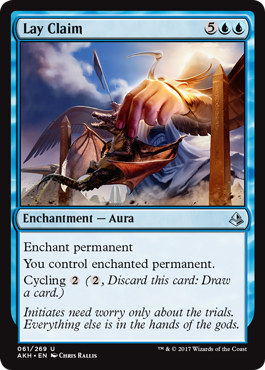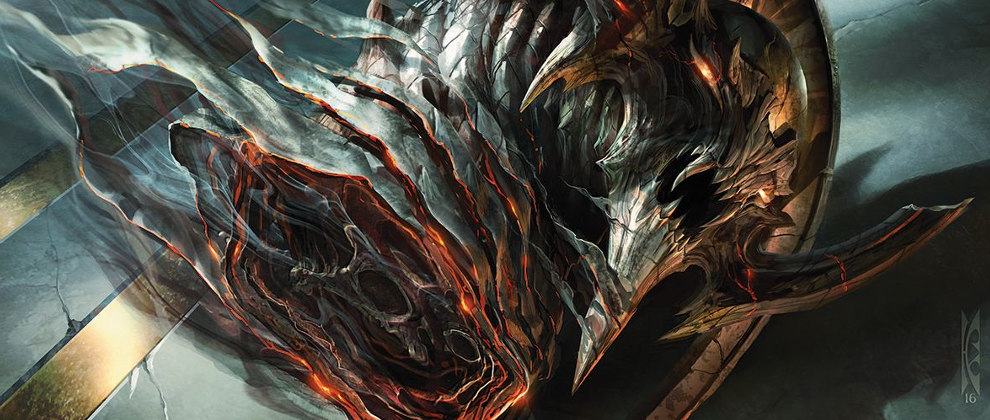
Archfiend of Ifnir knows what I’m talking about…
There are a ton of things to love about the Amonkhet draft environment. Combat math can become rather involved. There are triggered abilities, anthem effects and Auras that actually matter. The set takes a deep dive into the flavor of a culture that’s not just western fantasy. There are a whole slew of interesting interactions that make you think about a typical game differently than you would in other formats.
Why, then, is it the case that the more I play, the more I hear frequent drafters express disdain for the format? Just a few weeks ago, when I asked my opponents what they thought of Amonkhet, they almost always replied that they really enjoyed it. Recently, however, answers from the same players are closer to “meh” and “I don’t like it…”
One thing I am growing to dislike more and more are the number of cards in Amonkhet that can steal a hard fought game. Of course, it always feels bad to lose when the board state was previously leaning in your favor – that’s not what I mean.
Magic: the Gathering has always had swingy cards, but Amonkhet seems particularly full of them. This is partially what people talk about when they call Amonkhet a “prince format.” Games that aren’t won quickly on the ground or in the air are often determined by bomb rares (okay – and sometimes bomb uncommons).
Here are just a few ways to steal a game in Amonkhet, in no particular order.
Punching Through, Out of the Blue
These are the kinds of stolen games that hurt the most. You’re well into the mid game. You’ve stabilized against your opponent’s early aggression, and you’ve got your opponent on the back foot. At this point, you may be leaving back much of your board to block, while chipping away with a flyer or two.
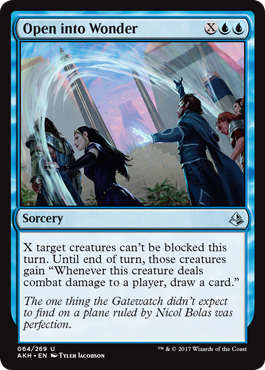 |
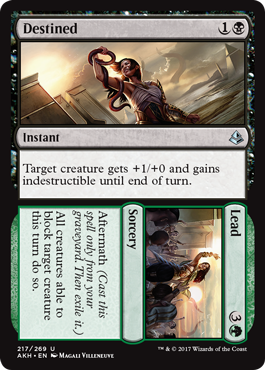 |
Then your opponent hits six mana, casts Open Into Wonder to make their creatures unblockable and swings for lethal. Forget about drawing cards. Despite giving creatures a Keen Sense ability (er, this is Amonkhet, so Sixth Sense), this card is almost always going to be saved for the moment it wins the game.
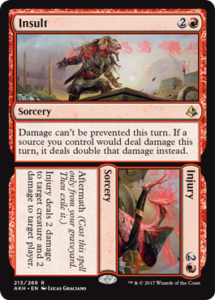
Does what it says on the tin.
Maybe your opponent isn’t playing blue. Maybe they’re in green black, in which case they also spend six mana to cast both halves of Destined / Lead, targeting a Wasteland Scorpion. They swing in again for unblockable lethal damage, and they can have the pleasure of killing off three of your creatures for kicks (or for the event you have a trick to save yourself).
A similarly backbreaking trick – though admittedly of a different variety – comes in the form of Insult / Injury. Yet again, both halves of the card can be cast for six total mana. That cost gets your opponent a slew of powerful abilities: they will generally kill one of your best blockers, they will blast your face for 4 damage, and they will attack with creatures that deal double damage.
More often than not, whether I’ve cast Insult / Injury or had it cast against me, it has ended the game on the spot.
Overwhelming Inevitability
These are some of the cards that truly exemplify Amonkhet as a prince format. We’re talking bomb rares that enter the battlefield and end the game, often in a matter of turns. These are the cards that make me shudder when my opponent taps seven or eight mana immediately after drawing their card for the turn.
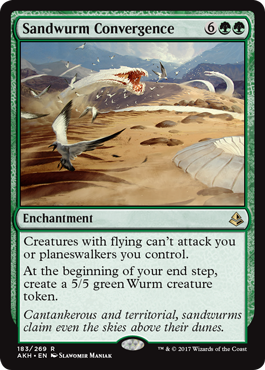 |
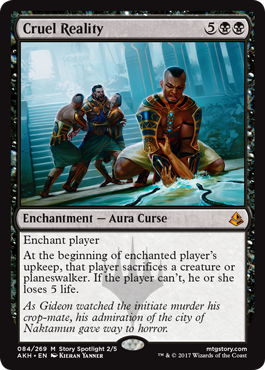 |
Seeing Cruel Reality cast – particularly when you only have one or two creatures in play – is demoralizing. If the game has made it to Turn 7 or later, and you haven’t gone wide, there’s a good chance you just concede. It’s often just not possible to maintain sacrificing a creature every single turn.
The same can be true when your opponent drops Sandwurm Convergence. With the skies locked down and the ground covered in 5/5 Wurms, there are not a lot of options. And that’s one of the problems with these particular cards – they show up more often than you’d expect, and you have few ways to deal with their effects. For as powerful as these and the Cartouches are, Amonkhet has surprisingly little in the way of enchantment removal. Your best bet is counter magic or Forsake the Worldly.
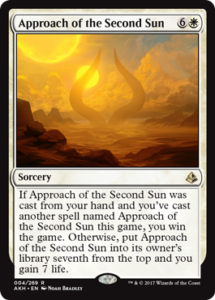
An arguably fairer way to steal the game is Approach of the Second Sun. Assuming no extra card draw, seven turns can be a long time in Amonkhet limited. That leaves you a great opportunity to whittle down your opponent’s life before they can cast Approach for the second time and win the game.
Still, Approach of the Second Sun provides a clock that does not require your opponent to attack. So long as they can hold down the board long enough, it’s not unreasonable that they pull off the alternate win condition. On the surface, this looks like a classic junk rare, but if an opponent casts it, you need to believe it’s a realistic threat.
The Last Mile
The last category of cards that can truly come out of the blue to steal a game are what I like to call “the last mile.” These cards don’t as much take the game when you’re very far ahead, but rather, they end the game sooner than you’re planning on.
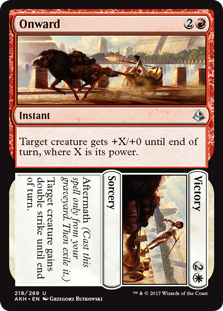 |
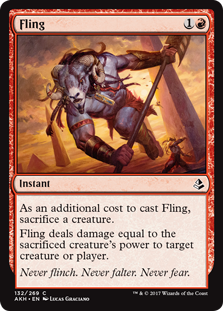 |
Both Onward / Victory and Fling work best when they catch you off guard, ending the game one or more turns sooner than expected. In my experience, they show up infrequently enough that you just forget to play around them (if you even can).
Let’s say, for example, that you’re at 12 life with lethal damage on the board facing your opponent. Your opponent attacks with a Desert Cerodon. If you block, you no longer have lethal on the board, so you let it through. You do so knowing that worst case, you can block next turn, and likely several turns after that.
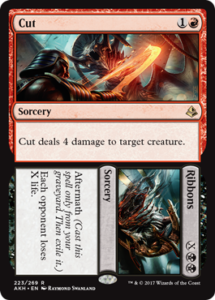
Either Fling or the top half of Onward / Victory kill you here, and it was reasonable to not play around them. Ending the game just when you thought it was locked down will certainly make you play differently in the next.
Cut / Ribbons is another way for your opponent to go the last mile. It obviously plays a bit differently in that it’s not an instant-speed surprise like the last two. It is also arguably an “overwhelming inevitability” -type card.
Nevertheless, a graveyard dwelling Fireball that you likely cannot deal with rarely feels fair. If your opponent Cuts a creature early in the game, it’s almost like having your life total immediately reduced by the number of lands your opponent plays (minus 2). Late in the game, it is definitely possible to see both sides cast in the same turn.
Totally Fair Creatures
I can’t call Amonkhet a prince format and not at least mention some of the totally, totally fair creatures in the set. These are certainly the fairest of the “game stealing” cards you’ll see. There are ways to deal with them, and perhaps it’s more appropriate to categorize them generally as bomb rares.
However, these cards turn on a very short clock, and if left unchecked, the game is over.
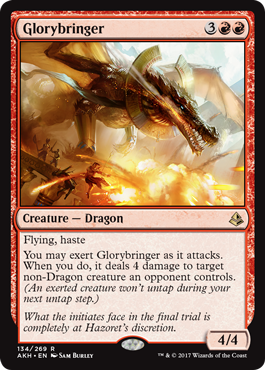 |
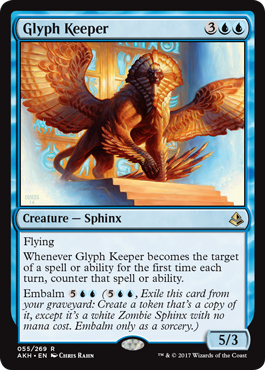 |
Glyph Keeper is a strong reason to play blue in Amonkhet. Blue is generally considered one of the weaker colors in the format, but the Sphinx is one card that not only creates a 4-turn clock, but in many situations, it requires at least four pieces of removal. That’s not to mention the fact that it can see play as early as Turn 5 (or Turn 4 in the blue-green ramp deck).
Last – but certainly not least – is a rare that’s often considered the top pick in the entire format. At only five mana in the strongest aggro color in Amonkhet limited, Glorybringer has evasion, haste and kills a non-Dragon creature every other turn via exert. It does just about everything you could ask for and more. If it doesn’t outright win the game, it can quickly destroy the opposing board. Glorybringer is admittedly far from actually stealing the game every time it hits the battlefield, but it can certainly feel that way.
In the Hands of the Gods
Perhaps the only thing worse than losing to these cards is playing them yourself, only to have them Lay Claim‘d. But let’s be honest, here. Your opponent played a 7-mana spell in blue, so we’ll let them have this one. Fair and square.
